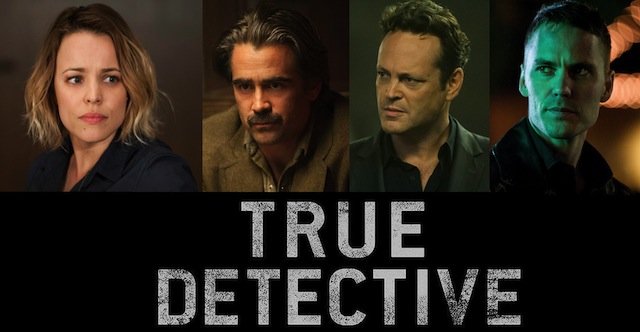Given the ever-improving nature of television dramas, it’s difficult to write confidently about a series after the pilot episode or to write off a series after a bad episode or two. How many people absolutely loved the first episode of The Wire? Writers and producers are playing a long game and people who reflect on the medium must adapt as well. Yet as a massive fan of the first season of True Detective, I wanted to weigh in on last night’s second season premier, even though there’s not much, in terms of narrative, to speak of.
Having lived in California now for the better part of eight years and having driven up and down the state countless times, it’s nice to see the stark geographical diversity and the physical landscapes against which this story is set through such stunning cinematography. From the lush vineyards to barren hillsides to the dingy Los Angeles and the non-city Vinci, it’s all scarred territory for scarred people, which, although not yet as compelling as the first season, are the appeal so far.
I’m instantly intrigued by the characters. Ray Velcoro (Colin Farrell) is a Vinci detective who is helping “raise” a son that may or may not be the result of his former wife having been raped. Ani Bezzerides (Rachel McAdams), short for Antigone, is a Ventura police officer who’s sister Athena is an online sex performer. Their father (played by David Morse) is, of course, a spiritual guru. What else would he be with kids named after Oedipus’ daughter and a Greek goddess? Paul Woodrugh (Taylor Kitsch) is ex-army turned California Highway Patrol who takes Viagra to have sex with his girlfriend, and he tells his boss, “I need to be on the bike, it suits me.” Is he referring to the long stretches of solitary highway or the throbbing motor between his legs? I’m not sure.
Writer/creator Nic Pizzolatto seems to be carrying over at least one theme from the first season, that of the meaning(lessness) of life and our efforts to make sense of our lives and the events that comprise them. Ani’s father says to a group of devotees, “Today’s exercise is to recognize the world as meaningless and to understand that God did not create a meaningless world. Hold both thoughts as irrefutable and equal, because this is how we must live now in the final age of man.” While I appreciate the exercise, I prefer my spirituality more southern-fried and McConaughey’d and less on-the-nose. Which seems an early problem to look out for. The disappeared city manager that forms the heart of the narrative of this first episode (if there is one) is named Caspere. The friendly ghost reference is a little cheeky, but the state in which we find him at the end is hauntingly grotesque. Did someone literally screw his eyeballs out?
As someone who is eagerly awaiting the development of high speed rail in California (a key plot point in at least the pilot), I’m aware of the debates and fears over its arrival, many of which center on rampant over-development along its path. The best lines of the pilot might have been the last.
Elvis (Ani’s partner): The fuck is Vinci?
Paul: A city, supposedly.
Elvis: That’s bullshit.
Of course, Velcoro’s threat to Aspen (the kid bullying his son) could give them a run for their money. I won’t spoil it in case you haven’t seen it.
